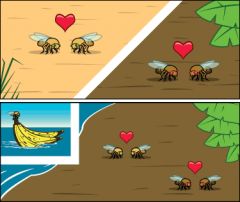Grade Level(s):
- 9-12
- 13-16
- General
Source:
- Evolution: Education and Outreach
Resource type:
- Article
Time: 40 minutes
Overview
Punctuated equilibrium is sometimes erroneously cited as evidence that evolutionary biology still hasn't figured out how evolution works. In fact nothing could be further from the truth. Punctuated equilibrium builds on (not tears down!) established evolutionary theory. Find out how the process works.
This article appears at SpringerLink.

- [History of life: Grades 9-12] Rates of evolution vary.
- [History of life: Grades 9-12] Evolutionary change can sometimes happen rapidly.
- [History of life: Grades 9-12] Some lineages remain relatively unchanged for long periods of time.
- [History of life: Grades 13-16] Rates of evolution vary.
- [History of life: Grades 13-16] Evolutionary change can sometimes happen rapidly.
- [History of life: Grades 13-16] Some lineages remain relatively unchanged for long periods of time.
- [Evidence of evolution: Grades 9-12] The fossil record provides evidence for evolution.
- [Evidence of evolution: Grades 9-12] The fossil record documents patterns of extinction and the appearance of new forms.
- [Evidence of evolution: Grades 9-12] The sequence of forms in the fossil record is reflected in the sequence of the rock layers in which they are found and indicates the order in which they evolved.
- [Evidence of evolution: Grades 13-16] The fossil record provides evidence for evolution.
- [Evidence of evolution: Grades 13-16] The fossil record documents patterns of extinction and the appearance of new forms.
- [Evidence of evolution: Grades 13-16] The sequence of forms in the fossil record is reflected in the sequence of the rock layers in which they are found and indicates the order in which they evolved.
- [Mechanisms of evolution: Grades 9-12] Speciation is the splitting of one ancestral lineage into two or more descendant lineages.
- [Mechanisms of evolution: Grades 9-12] Speciation is often the result of geographic isolation.
- [Mechanisms of evolution: Grades 9-12] Speciation requires reproductive isolation.
- [Mechanisms of evolution: Grades 9-12] Occupying new environments can provide new selection pressures and new opportunities, leading to speciation. (LS4.C)
- [Mechanisms of evolution: Grades 13-16] Speciation is the splitting of one ancestral lineage into two or more descendant lineages.
- [Mechanisms of evolution: Grades 13-16] Speciation is often the result of geographic isolation.
- [Mechanisms of evolution: Grades 13-16] Speciation requires reproductive isolation.
- [Mechanisms of evolution: Grades 13-16] Occupying new environments can provide new selection pressures and new opportunities, leading to speciation.
- [Nature of science: Grades 9-12] Scientists may explore many different hypotheses to explain their observations. (P7)
- [Nature of science: Grades 13-16] Scientists may explore many different hypotheses to explain their observations.
- [Studying evolution: Grades 9-12] Scientists use fossils (including sequences of fossils showing gradual change over time) to learn about past life.
- [Studying evolution: Grades 13-16] Scientists use fossils (including sequences of fossils showing gradual change over time) to learn about past life.
- Disciplinary Core Idea LS4.C: Adaptation
- Science and Engineering Practice 7. Engaging in argument from evidence
This article is written for teachers and comes with links to additional examples, supplementary information, and classroom tips. It is also available as a pdf at https://link.springer.com/content/pdf/10.1007/s12052-007-0025-4.pdf
